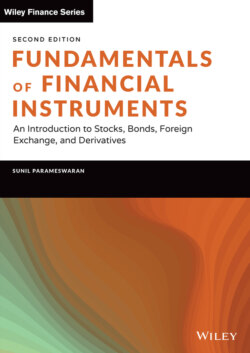Читать книгу Fundamentals of Financial Instruments - Sunil K. Parameswaran - Страница 34
На сайте Литреса книга снята с продажи.
EXAMPLE 1.1
ОглавлениеWIPRO Technologies, an Indian company, has imported products from Frankfurt, and has entered into a forward contract with HSBC to acquire EUR 500,000 after 60 days at an exchange rate of INR 72.50 per euro. This is clearly a forward contract, for while the terms and conditions, including the exchange rate, are fixed at the outset, the currency itself will be procured only 60 days after the date of the agreement. Sixty days hence, WIPRO will be required to pay INR 36,250,000 to the bank and accept the euros. The bank as per the contract is obliged to accept the Indian currency and deliver the euros.
Forward contracts and futures contracts are similar in the sense that both oblige the buyer to acquire the underlying asset on a future date, and the seller to deliver the asset on that date. And in the case of either kind of security, both the buyer and the seller have an obligation to perform at the time of expiration of the contract. There is one major difference between the two types of contracts, however. Futures contracts are standardized, whereas forward contracts are customized. The terms standardization and customization may be understood as follows. In any contract of this nature, certain terms and conditions need to be clearly defined. The major terms which should be made explicit are the following:
1 The number of units of the underlying asset that have to be delivered per contract.
2 The acceptable grade or grades that may be delivered by the seller.
3 The place or places where the seller is permitted to deliver.
4 The date or in certain cases the time interval, during which the seller has to deliver.
In a customized contract, the preceding terms and conditions have to be negotiated between the buyer and the seller of the contract. Hence, the two parties are at liberty to incorporate any features that they can mutually agree to. Forward contracts come under this category. In standardized contracts, however, there is a third party that will specify the allowable terms and conditions. The two parties to the contract have to design the terms and conditions within the framework specified by the third party and cannot incorporate features other than those that are specifically allowed. The third party in the case of futures contracts is the futures exchange, which is the trading arena where such contracts are bought and sold.
